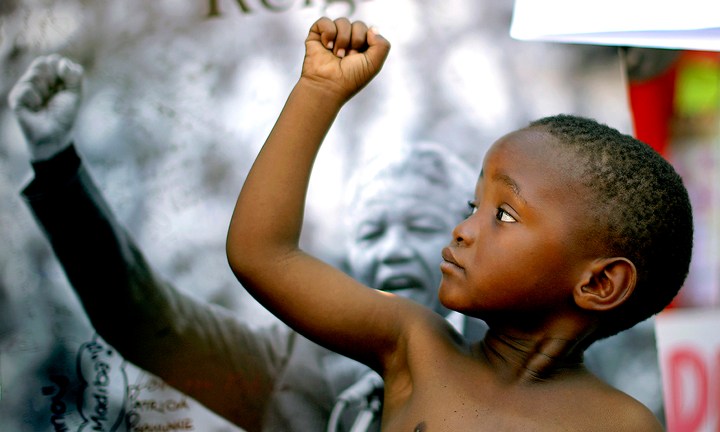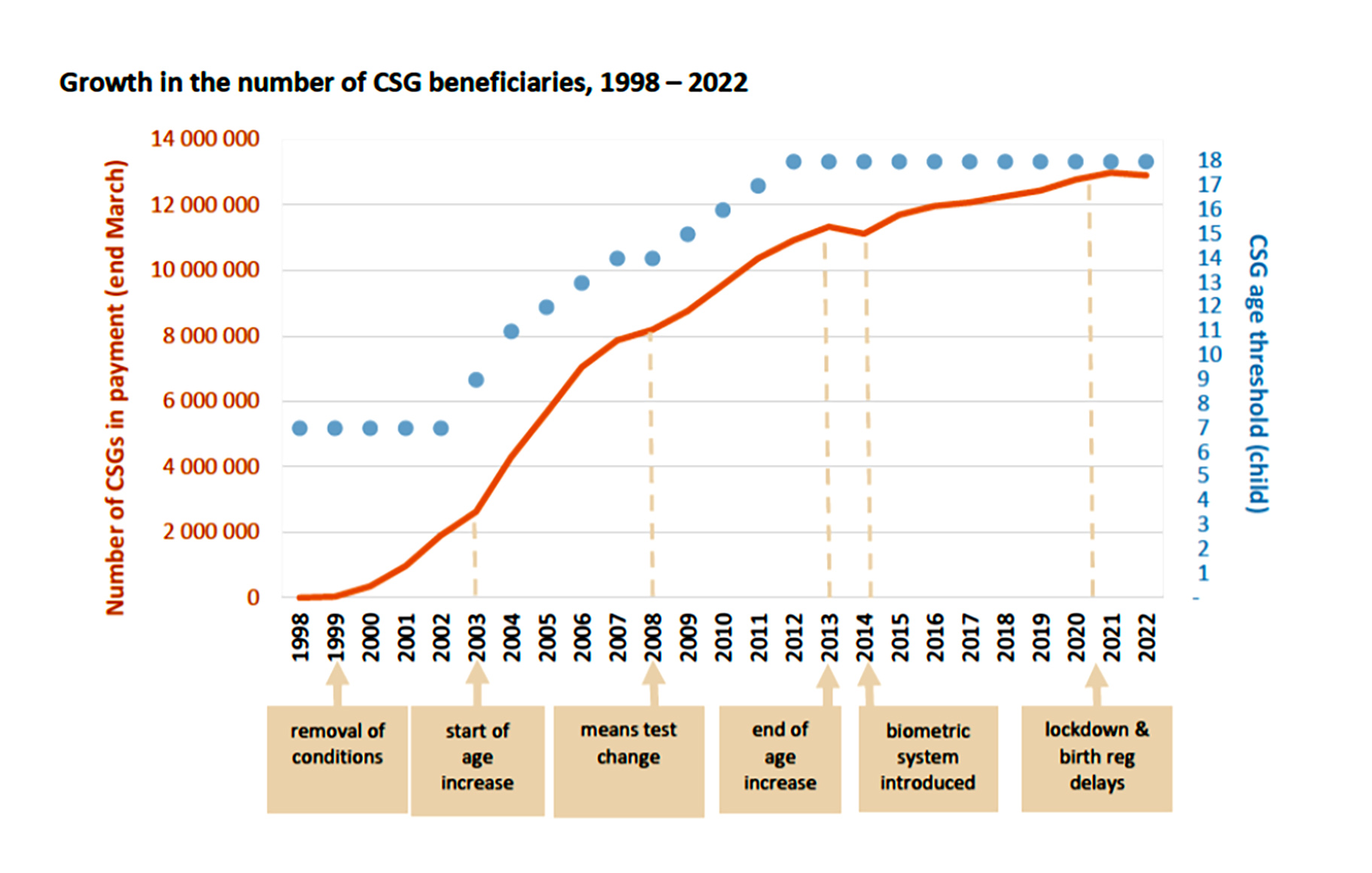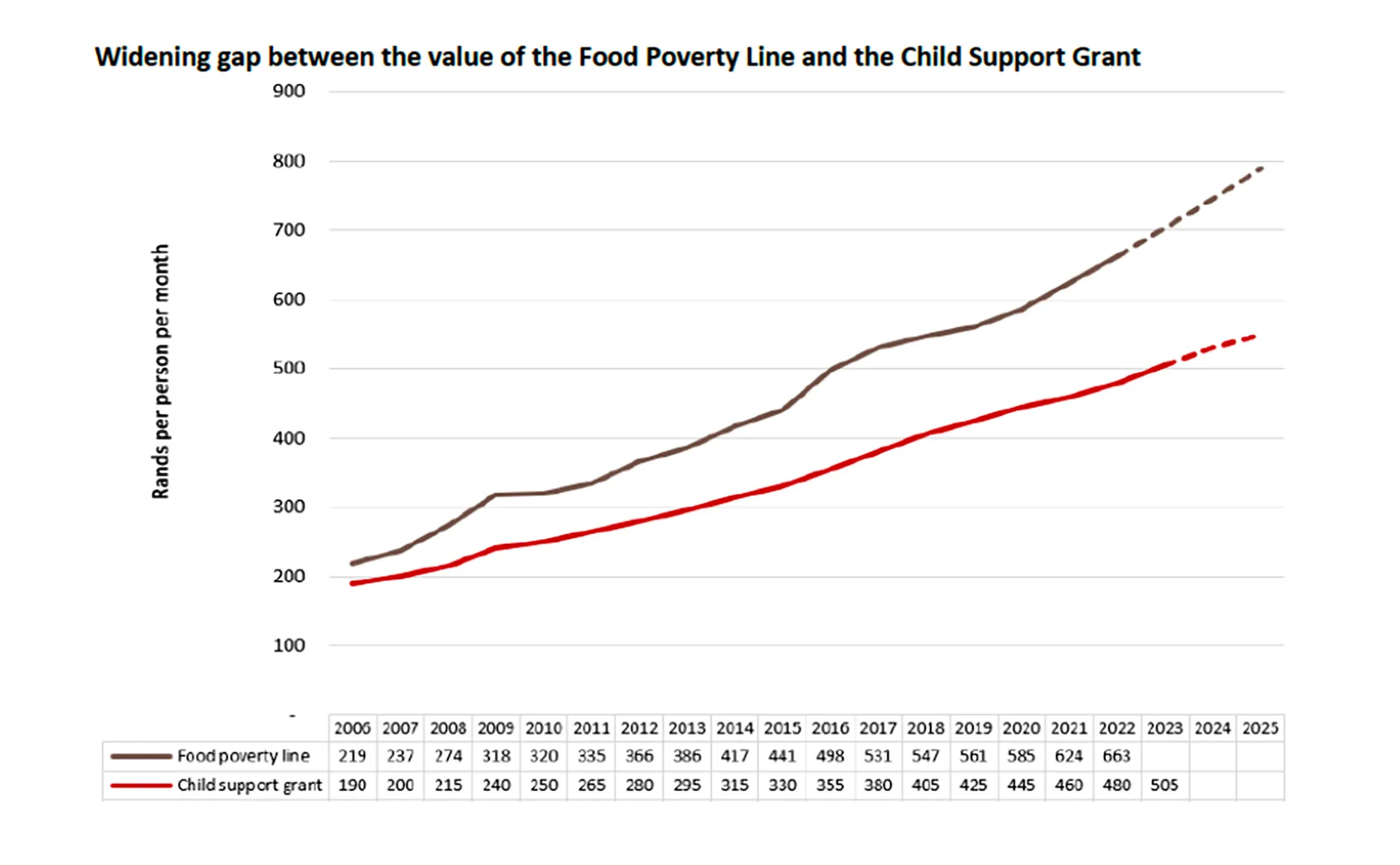
STARVING KIDS
Eight million hungry children: New report about the shocking impact of poverty on young South Africans

A new report on child poverty by the Department of Social Development (DSD) brings new data, including the fact that eight million children are not getting enough nutrition. With the constitutional duty on the state to ensure every child has ‘basic nutrition’, it will add pressure on the Treasury to reconsider its policy of fiscal consolidation and cutting the social wage.
The report, titled ‘Reducing Child Poverty, A Review of Child Poverty and Value of the Child Support Grant’ (available here), was commissioned by the DSD and researched and written by the Children’s Institute at UCT.
Launched at the Nelson Mandela Foundation in Johannesburg on Friday, it looks at the value of the Child Support Grant (CSG), currently a monthly amount of R500, in the context of rising poverty. This is considered necessary because in recent years, the Covid-19 pandemic and its aftermath, particularly rapidly rising food prices, has led to a deterioration in the quality of lives of children.
The report notes that despite 13 million children receiving the CSG, “over seven million remain below the food poverty line (FPL), which was R663 per person per month in 2022.
Dr Kath Hall, a senior researcher at the Children’s Institute, presented “a wealth of evidence of the positive impacts of the CSG” since its introduction, in birth registration, nutrition, child health and attendance at Early Childhood Development (ECD). Hall said that child poverty rates had dropped by 20% as the CSG expanded between 2003 and 2013.
But from 2013 it had flatlined. “We need to intervene now. Eight million children are not getting enough nutrition. We are back to where we were a decade ago.”
According to Linton Mchunu, the Director-General of the DSD, 13 million children currently receive the CSG. Yet, despite this and other social security interventions, such is the depth of poverty that an estimated 27.5% of children are stunted due to malnutrition.
Pediatricians explain that stunting is due to chronic undernutrition, and is very hard to recover from.

(Graphic: Supplied)
Child poverty rising
The report states that “poverty rates rose sharply in 2020 and 2021 as a result of lockdown and job losses” and that “Child poverty remains racially and geographically distorted. African children and those living in former homelands, are most likely to be poor. While the national child food poverty rate was 33% in 2019, it was 37% for African children and 51% for African children living in rural areas and former homelands.”
“Of the nearly eight million children in the former rural homelands, just over half (four million) are in food poverty, and three quarters (six million) are below the upper bound poverty line.” The report’s authors say this is a form of indirect discrimination against black children.
Read more in Daily Maverick: If children can’t grow well, the economy can’t grow well
In the context of a Constitution that guarantees children’s socio-economic rights “to basic nutrition, shelter, basic health care services, and social services” as well as “everyone’s rights to social security”, the report looks in particular at the role the CSG can play in addressing child poverty.

(Graphic: Supplied)
According to the report authors, up to this point the CSG “has been especially successful at reaching large numbers of poor children with relative ease and it has the best pro-poor targetting of all the existing social grants”.
However, the report adds that the biggest weakness of the CSG is that its value, R500 per month, “is too small to protect the poorest children from hunger, malnutrition and stunting.” As the graph below shows, the gap between the CSG and the food poverty line has been growing inexorably.
The report notes that despite 13 million children receiving the CSG, “over seven million remain below the food poverty line (FPL), which was R663 per person per month in 2022. In 2021, 37% of all children in South Africa (SA) were living below this poverty line.”
Here the report notes that the CSG “can bring children out of poverty only if they are not very far below the poverty line to start with”.

Child poverty remains racially and geographically distorted. (Photo: Hoseya Jubase)
Grant no longer meets basic needs
The DSD admits that the CSG was last reviewed in 2010 and no longer meets the cost of the basic needs it was established for. In recognition of this deficit and its profound and far-reaching consequences on children’s lives, the Children’s Institute modeled the benefits and the financial costs of several options for increasing the CSG.
They report that:
“Child food poverty can be eliminated for children by increasing the CSG to the upper bound poverty line (R1,335 in 2021). Food poverty can be substantially reduced (from 33% to 25%) by increasing the CSG to the food poverty line (R624 in 2021 – now R760).”
In the 2023/23 budget, the CSG cost R77-billion. To increase it to the food poverty line “for all poor children” would cost the state a further R23-billion. To do this in a phased manner, starting with only pre-school children, would cost R10-billion, they say.
But here’s the rub. Any increase to the CSG requires the agreement of the Minister of Finance. Yet, the report is being launched in the context of austerity measures being introduced by the National Treasury who, it was noted several times by speakers, were not present.
At the start of the launch, the DSD Director-General Linton Mchunu quipped, “We’ll share the report with them and debate later.” In their absence, Busi Sibeko, from the Parliamentary Budget Office (PBO) also commented that “fiscal consolidation is detrimental to children, and means that as a country we will not meet our national development plans.” Sibeko’s presentation was praised by Mchunu, particularly because it explained “the longer term implications of budget cuts.”
Quoting Nelson Mandela as saying “we do not want freedom without bread, nor do we want bread without freedom” the Minister of Social Development Lindiwe Zulu, made a commitment to “share this report with the relevant mandates of government”, but did not go further.
Finally, the report’s launch also takes place in the midst of fierce debates about reforms to social security, including the introduction of a Basic Income Grant, and in a week when the Institute for Economic Justice has published research which it argues “shows reports of an immediate and acute ‘fiscal crisis’ in South Africa are being exaggerated for political purposes”.
“Our analysis shows that the much-discussed revenue shortfall is within historical norms and well within the government’s ability to close. The data does not support claims that we are standing on the edge of a so-called ‘fiscal cliff’ or ‘financial crisis’. National Treasury is likely stoking panic to push through unnecessary and unpopular budget cuts.” DM




















The situation in China was the same where most families had 8 or more children. Children were malnourished and the government stepped in and allowed only 1 child per family. This will never happen in Africa, but until black Africans stop having children they can’t afford, it will continue.
How do you ensure that the child benefits from any amount given ? The parents can spend the money on themselves instead of their children. It happened in the UK and now the child allowance is restricted to the first 2 children.
I support the effective use of social grants but the argument presented here is diminished by the central graphics. The “Widening gap” maps the CSG as a fairly consistent 75% of the FPL over 15 years or so. As the rand values increase the lines appear to diverge. This is misleading when accompanied by the “As the graph shows” statement.
In the first graphic flatlining of enrolment is perhaps to be expected as the majority of qualifiers is approached and with the exodus of those children who are moving past the qualifying age.
Without the graphics the arguments make more sense.
Free nutritious school meals might have a bigger impact on feeding children than a paltry grant. R23/ day cannot feed a child on anything but carbohydrates, and very few vegetables or meat. Please compare the image of our over-fed underperforming politicians and government officials, along with the billions in profits made by our supermarkets. The crisis of unplanned pregnancies and unsustainable family sizes is a very touchy subject, but central to the problem.
Yes – free school meals also encourages children going to school, which of course educates, which in turn is known to reduce unwanted pregnancies. ie win:win:win + the 4th huge win of educated children.
Just get it together you loser government.
This only if in lieu of the CSG. Can’t have both
Free nutritious food at school excellent idea, but malnourishment starts much earlier, and schools are not available to most. So once again, so much more effort needed in this area. Breadlineafrica is an excellent organisation for example. Children in their very first year of life need food, shelter, safety and LOVE to thrive. If deprived of these, it is difficult to get back on track, even if some or all of these are provided later.
And how many of these CSG recipients are without a father in the home? Deny CSG to any applicant where there is no father in the household. The CSG promotes having children for no other reason than money. 70% of black children in SA are in fatherless households. This is a cultural issue and Government should address this instead of giving more handouts of other people’s money
a devastating but true comment. Fatherless households, and cultural issues need to be addressed. Very little of the grant finds it’s way to the child. A different incentive should be made to ensure children actually receive food, shelter and education. The current system is inviting more babies, with younger mothers. A validated survey shows that the average age boys become fathers is 13, and likewise girls, who may encouraged to help to feed the family this way.